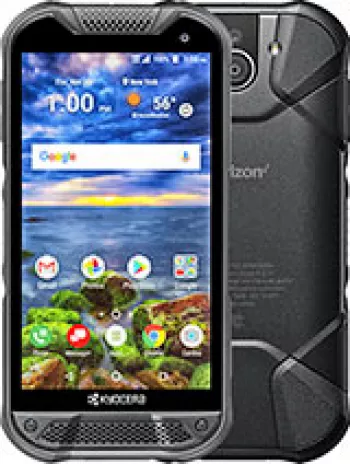
Network
The Kyocera Rise C5155 supports CDMA and EVDO network technologies. It operates on 2G bands with CDMA 800/1900 and on 3G bands with CDMA2000 1xEV-DO. The device offers data speeds up to EV-DO Rev.A at 3.1 Mbps, which was quite satisfactory for basic internet browsing, emailing, and using various applications during the time of its release.
Launch
The Kyocera Rise C5155 was announced in May 2012 and released in August 2012. However, the model has been discontinued since then. Upon its release, it appealed to a segment of users looking for an affordable smartphone with the functionality of both touchscreen and physical keypad input.
Body
In terms of design, the Kyocera Rise has dimensions of 113 x 60.5 x 14.3 mm and weighs in at 158 grams. It features a practical and convenient QWERTY keyboard which slides out from the main body, an attribute which distinguished it from many other smartphones at the time. It uses a Mini-SIM, and its overall build highlights utilitarian functionality rather than premium aesthetics.
Display
This device is equipped with a 3.5-inch IPS LCD display. It held a screen-to-body ratio of approximately 53.4% with a resolution of 320 x 480 pixels and a pixel density of about 165 ppi. While modest by today’s standards, the display was adequate for the target market—users looking for a basic, budget-friendly smartphone experience.
Platform
The Kyocera Rise operates on Android 4.0 Ice Cream Sandwich. It is powered by the Qualcomm MSM8655 Snapdragon S2 chipset, featuring a 1.0 GHz CPU and an Adreno 205 GPU. This combination provided sufficient power for handling basic tasks, such as calling, texting, and using less demanding applications of its era.
Memory
The smartphone comes with 512MB of RAM and 2GB of internal storage. One of its advantages was the inclusion of a microSDHC card slot, allowing users to expand the storage with a microSD card. The device came with 2GB pre-installed, catering to users who needed only modest storage capabilities for everyday use.
Main Camera
For photography, the Kyocera Rise includes a single 3.15 MP autofocus camera. While it lacks features like flash or advanced settings found in modern smartphones, it does offer the capability to capture basic images and record video, which could serve as a simple solution for casual photography and video calls.
Sound
The sound system of the Kyocera Rise features a loudspeaker and a 3.5mm headphone jack, allowing users to connect their choice of headphones or speakers for audio playback. This was advantageous for personal listening experiences, especially given the absence of integrated front-facing speakers.
Comms
Communication capabilities include Wi-Fi 802.11 b/g/n with hotspot functionality, allowing the device to connect to wireless networks and share its internet connection. Bluetooth 2.1 technology with A2DP and EDR is supported for wireless connectivity to other devices. GPS with A-GPS provides location services, though there is no radio feature. The USB port is a standard microUSB 2.0 for charging and data transfer.
Features
The Kyocera Rise includes several sensors such as an accelerometer, proximity sensor, and compass, enhancing its functionality for basic applications and user interaction. These sensors enable the device to detect motions and orientations, offering improved user experiences for certain apps and functionalities.
Battery
The smartphone is powered by a removable Li-Ion 1500 mAh battery, providing a talk time of up to 8 hours and 40 minutes. Having a removable battery was advantageous at the time as it allowed users to replace the battery once it started losing efficiency, extending the life of the device.
Miscellaneous
Available in black, the Kyocera Rise may not be packed with options, but its straightforward design and utilitarian aesthetic appeal to consumers seeking functionality over flashy design. It was aimed at users who needed a reliable, no-frills smartphone with the flexibility of a physical keyboard.
Key Features of Kyocera Rise C5155
- Supports CDMA and EVDO network technologies for reliable connectivity.
- QWERTY keyboard for easy and comfortable typing.
- 3.5-inch IPS LCD with a resolution of 320 x 480 pixels.
- Runs on Android 4.0 Ice Cream Sandwich OS.
- Powered by Qualcomm MSM8655 Snapdragon S2 chipset with a 1.0 GHz CPU and Adreno 205 GPU.
- Offers 2GB internal storage with 512MB RAM, expandable via a microSDHC card slot.
- Features a 3.15 MP autofocus rear camera.
- Includes Wi-Fi connectivity with Wi-Fi hotspot functionality.
- Supports GPS and A-GPS for location services.
- Comes with a removable 1500 mAh Li-Ion battery offering up to 8 hours and 40 minutes of talk time.
- Equipped with essential sensors like accelerometer, proximity, and compass.
- Includes a 3.5mm audio jack and loudspeaker.
Disadvantages of Kyocera Rise C5155
- Discontinued model with limited support and updates.
- Low-resolution display (320 x 480 pixels) with low pixel density (~165 ppi).
- Outdated Android OS version (Android 4.0 Ice Cream Sandwich).
- Low internal storage (2GB) and RAM (512MB).
- Limited processing power with 1.0 GHz single-core CPU.
- No front-facing (selfie) camera.
- Only 3.15 MP main camera with basic video capabilities.
- Older Bluetooth version 2.1, which may not support newer peripherals well.
- Lacks FM radio feature.
- Heavy body (158 g) with somewhat bulky dimensions.


View Also
More Phones
All Rights Reserved +13904 Phones © Mobilawy 2025
























